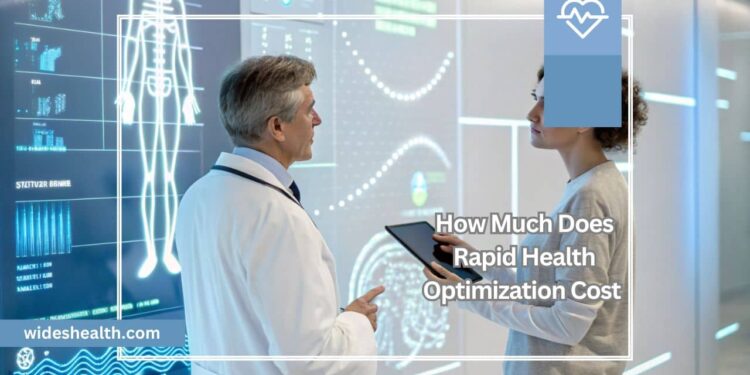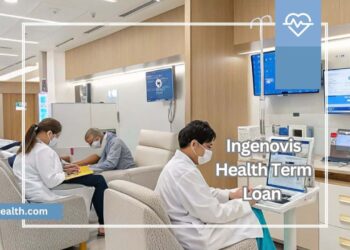In today’s fast-paced world, rapid health optimization is revolutionizing how individuals enhance their physical and mental well-being. From elite athletes to busy executives, many are turning to advanced diagnostics, personalized treatment plans, and cutting-edge therapies to achieve peak performance.
However, a common question arises—how much does rapid health optimization cost? Prices vary depending on the services, technology, and level of customization. In this guide, we’ll explore the costs, key factors affecting pricing, and whether investing in health optimization is truly worth it.
What Is Rapid Health Optimization?
Rapid health optimization is a proactive, science-based approach that focuses on enhancing energy, recovery, longevity, and mental clarity rather than just treating illnesses. Unlike traditional healthcare, which often reacts to health problems, rapid health optimization identifies imbalances early and creates personalized treatment plans to help individuals perform at their best.

This process includes comprehensive blood tests that assess over 100 biomarkers, hormone balancing and TRT for increased vitality, peptide therapy for muscle recovery and anti-aging, and genetic testing to develop customized fitness and nutrition plans. With advanced medical technology and AI-driven health insights, rapid health optimization helps individuals reach peak physical and mental performance, allowing them to live longer, healthier, and more fulfilling lives.
How Much Does Rapid Health Optimization Cost?
The cost of rapid health optimization varies based on the services included, the clinic you choose, and the level of personalization. On average, pricing ranges from $1,250 to $5,000+, depending on the complexity of the treatment plan.
Cost Breakdown of Rapid Health Optimization:
| Service | Estimated Cost |
| Comprehensive Blood Panel (100+ biomarkers) | $1,250 – $2,500 |
| Genetic Testing & Metabolic Analysis | $500 – $1,500 |
| Hormone Optimization (TRT, Peptides, etc.) | $2,000 – $5,000 per year |
| Personalized Fitness & Nutrition Plans | $1,000 – $3,000 |
| Follow-up Consultations & Adjustments | $200 – $500 per session |
| AI-Powered Health Insights & Coaching | $2,000 – $4,000 per year |
Understanding these costs will help you plan your health investment wisely.
Key Factors That Influence Rapid Health Optimization Costs:
Type of Testing Required:
The more detailed your blood work and genetic analysis, the higher the cost. Some clinics test over 100 biomarkers, providing a precise and customized health plan. While these comprehensive tests offer valuable insights, they can increase the overall price of the optimization process.
Personalized Treatment Plans:
Every person’s health needs are unique, and custom treatment plans affect the total cost. If your plan includes hormone optimization, peptide therapy, or metabolic adjustments, the expenses may increase due to longer monitoring, specialized medications, and frequent treatment adjustments tailored to your body’s needs.
Advanced Technology & AI Integration:
Some providers use AI-driven health analysis to improve accuracy and efficiency in treatment. These systems help refine treatments and adjust plans in real time, leading to better health outcomes. However, this cutting-edge technology adds to the total cost, making it a premium feature in health optimization.
Frequency of Follow-Ups & Monitoring:
Health optimization isn’t a one-time process—it requires regular check-ups and progress tracking. Many programs include multiple blood tests before, during, and after treatment, each costing between $200 and $500. While these tests ensure effectiveness, they also increase the overall investment.
Expert Consultations & Concierge Services:
Some high-end programs offer 24/7 medical support and personalized concierge services, ensuring faster and more tailored care. While this enhances convenience and access to top specialists, these VIP services come at a higher price, making them a premium option for those who prioritize immediate medical attention.
Also read: Who Profits Most From America’s Baffling Health Care System – Top Beneficiaries Revealed!
Is Rapid Health Optimization Worth the Investment?
Science-Based Personalized Care:
Unlike traditional healthcare, which offers generic treatments, rapid health optimization focuses on your unique biomarkers. This means customized plans designed for your body, ensuring greater effectiveness and better results in achieving optimal health.
Long-Term Health & Performance Benefits:
By optimizing hormones, metabolism, and recovery, you can experience higher energy levels, better muscle recovery, and sharper mental clarity. These improvements can enhance your daily life, making it easier to perform at your best in both work and personal activities.
Faster & More Effective Results:
With the help of AI-driven diagnostics and expert guidance, rapid health optimization delivers faster and more accurate results than traditional healthcare. By eliminating guesswork, you get precise treatments that help you feel better, sooner.
Prevention of Future Health Issues
Rather than waiting for chronic conditions to develop, rapid health optimization detects imbalances early. This prevention-first approach helps you avoid future health complications, ultimately reducing long-term medical expenses and promoting a healthier, longer life.
If maximizing your performance and longevity is important to you, then investing in rapid health optimization can be a life-changing decision.
Why Is Rapid Health Optimization Expensive?
When it comes to optimizing health at a deep level, the costs can add up quickly. One major reason is the use of advanced blood testing technology, which examines hundreds of biomarkers to create a precise health profile. Additionally, these services rely on highly trained medical experts who carefully analyze results and design personalized treatment plans tailored to each individual.
Since these interventions focus on long-term benefits rather than short-term fixes, they require continuous monitoring and specialized care. However, as medical technology improves and becomes more widely accessible, the cost of rapid health optimization is expected to decrease, making it more affordable for the average person.
How to Lower the Cost of Rapid Health Optimization?
Choose Bundled Packages:
Many clinics offer discounted bundles, combining blood work, consultations, and monitoring into one package. This can save you money compared to paying for individual services separately, making it a cost-effective way to get comprehensive care.
Consider Subscription Plans:
Instead of paying upfront, many clinics offer monthly subscription plans ranging from $200 to $500 per month. This option spreads out the costs over time, making it easier to budget for ongoing health optimization services without a large initial payment.
Use HSA or FSA Accounts:
If you have a Health Savings Account (HSA) or Flexible Spending Account (FSA), you may be able to cover some expenses tax-free. Using these accounts reduces your out-of-pocket costs, making health optimization more affordable in the long run.
Start with Essential Services First:
If you’re on a tight budget, begin with comprehensive blood work and an initial consultation to assess your needs. Instead of committing to a full package upfront, gradually add treatments as needed to ensure you’re only paying for what’s necessary.
By planning wisely and exploring cost-saving options, you can make rapid health optimization more accessible while still reaping its full benefits.
Also read: What Can I Buy With Sunshine Health Rewards Card – Best Ways To Use It!
Is Rapid Health Optimization Worth It?
When it comes to improving overall well-being, rapid health optimization offers a science-backed approach that can be highly beneficial. This program is especially valuable for athletes and fitness enthusiasts who want to enhance performance and recovery.
Additionally, busy executives and professionals can use it to boost energy, focus, and productivity. Unlike generic health plans, this approach relies on real data and personalized strategies to help individuals achieve long-term wellness goals. For those serious about maximizing their health and performance, the investment can be a game-changer in living a healthier and
Future Trends in Rapid Health Optimization:
As technology continues to advance, the future of rapid health optimization looks promising, with innovations that will make these services more affordable and accessible. AI-powered precision medicine will revolutionize healthcare by analyzing data faster, leading to more accurate and cost-effective treatments.
Additionally, wearable technology and at-home biomarker testing will make health monitoring easier without expensive lab visits. With personalized nutrition and fitness plans based on genetic insights, individuals will achieve better results at lower costs. As more providers enter the market, competition will drive prices down, making elite-level health solutions available to more people.
FAQS:
How much does rapid health optimization cost?
The cost of rapid health optimization varies depending on the services included. A comprehensive blood test with over 100 biomarkers can cost $1,250–$1,500, while personalized treatment plans, including hormone therapy and peptides, can range from $200 to $1,000 per month.
Does insurance cover rapid health optimization services?
Most insurance plans do not cover rapid health optimization services because they focus on performance enhancement rather than treating medical conditions. However, some expenses may be eligible for HSA (Health Savings Account) or FSA (Flexible Spending Account) reimbursements.
What factors affect the cost of rapid health optimization?
Several factors influence pricing, including the type of testing, personalized treatment plans, technology used, and frequency of follow-ups. Clinics offering AI-driven analysis and concierge services tend to be more expensive but provide highly customized care.
Are there ways to lower the cost of rapid health optimization?
Yes! Some clinics offer subscription plans or bundled packages to reduce overall costs. You can also start with essential services like blood work and add treatments gradually. Using HSA/FSA accounts can also help lower out-of-pocket expenses.
Is rapid health optimization worth the investment?
For individuals focused on peak performance, longevity, and preventative healthcare, rapid health optimization can be a worthwhile investment. It provides science-backed, personalized health solutions that help optimize energy, recovery, and overall well-being, potentially reducing long-term healthcare costs.
Conclusion:
The cost of rapid health optimization varies based on the services, level of personalization, and advanced technologies used. While the initial investment may seem high, the long-term benefits—such as improved energy, faster recovery, and disease prevention—can make it a worthwhile choice for those seeking peak performance and longevity.
With cutting-edge diagnostics, AI-driven insights, and tailored treatment plans, rapid health optimization is shaping the future of preventative healthcare. As technology advances, these services will likely become more accessible and affordable, making high-level health solutions available to a broader audience. Investing in your health today can lead to a longer, healthier, and more fulfilling life in the future.
Related post:










